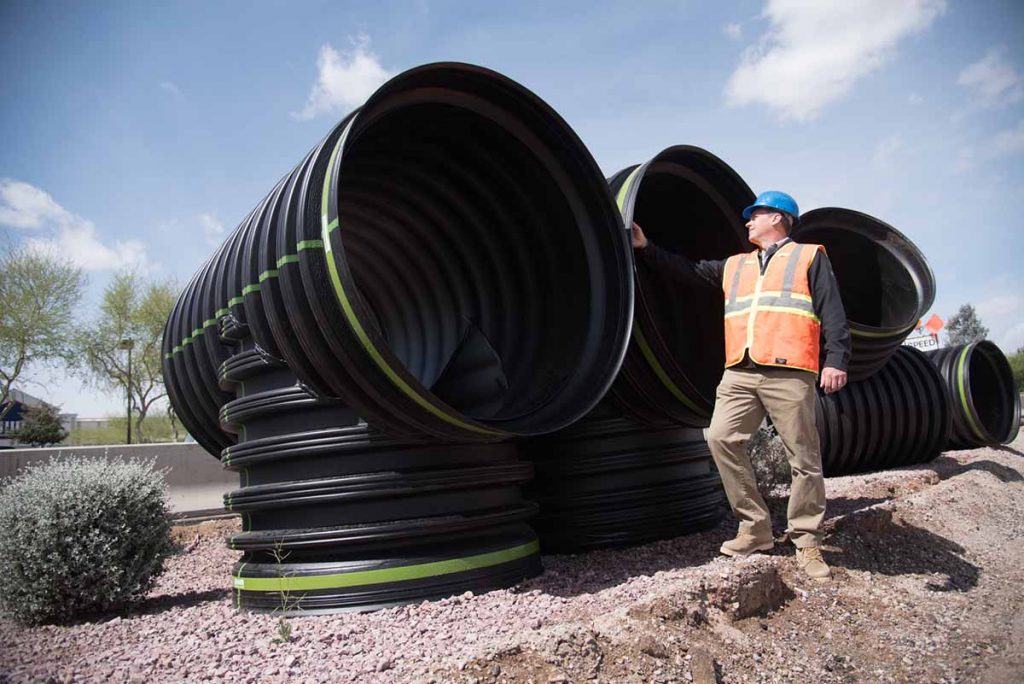
Recycled plastic piping is a key component in projects for stormwater management and more. | Courtesy of ADS
Currently, national leaders are calling for infrastructure improvements in communities across the country. They are also pushing for more plastic to be recycled.
In many ways, those two priorities complement one another. And it’s up to our sector to help clearly connect the dots for policymakers and the public at large.
The reality is that support and funding for plastics recycling can directly lead to enhanced roads, cleaner public spaces and a healthier environment. In the process, we can create sustainable jobs and fuel economic growth.
Increasing emphasis on PCR
The company I help lead, Advanced Drainage Systems, Inc., headquartered in Columbus, Ohio, is a perfect example of how the merging of plastics recycling and infrastructure projects brings benefits on multiple levels.
With an annual use of some 515 million pounds of recycled high-density polyethylene (HDPE), our company is the largest consumer of recycled HDPE and the second largest plastics recycler in the United States. The publicly traded, $8 billion corporation manufactures thermoplastic pipe from four to 60 inches in diameter and other products used to capture, convey, store and treat stormwater in residential, commercial, infrastructure and agriculture projects. ADS has also led the development, manufacturing and use of polypropylene pipe.

Brian King
Post-consumer recycled resin (PCR) plastics now make up more than half the content of many of our company’s thermoplastic pipes, and we have one product line – called MegaGreen – that was developed specifically to use recycled content.
This use of PCR of course has very real impacts on waste diversion. Made with greater than 40% post-consumer HDPE, for example, a standard 20-foot length of our 48-inch diameter HDPE pipe will take between 1,600 to 2,200 bottles out of the landfill.
The one-two punch
However, in addition to reducing tonnages sent to disposal, recycled plastic products are also used to protect the environment, often by way of innovative infrastructure projects. At ADS, we like to call this the “one-two punch” of the benefit of recycling plastics.
For one example of the PCR-infrastructure tie we can look to the Francisco Street Reservoir in San Francisco. The reservoir site, which dates to the 1850s, now serves as both a source of non-potable water and a park, featuring a picnic area, dog run, community garden, reservoir interpretive area, children’s playground and restrooms.
Underneath the site are two ADS stormwater capture and reuse systems that will perpetually provide water for the park’s irrigation and toilet flushing needs.
Another infrastructure-related end use of our products is the historic Lexington, Ky. Greyline Station bus terminal. The complex has been redeveloped into a multipurpose venue, and it harnesses stormwater best management practices that use our products to complete a “closed cycle” for on-site rainfall runoff. ADS pipe with recycled content is used in the collection, treatment, detention and reuse of this water resource.
Staying in the Bluegrass State, it’s worth noting the Kentucky Department of Transportation used more than 472,000 feet of ADS four-inch diameter corrugated HDPE pipe to meet federal mandates when the parkway between Bowling Green and Owensboro, Ky. became I-165. This completely new edge drain runs for nearly 90 miles to control stormwater runoff and meet federal highway requirements.
Senate connections
Recently, ADS hosted U.S. Sen. Ron Portman (R-OH), the lead Republican negotiator of the bipartisan infrastructure legislation (the Infrastructure Investment and Jobs Act) that passed the U.S. Senate this summer. He toured the ADS Pandora, Ohio plant – one of our 63 manufacturing plants worldwide – and met with employees.
“I had a great visit with ADS,” Sen. Portman said. “We discussed how the funding in the Infrastructure Investment and Jobs Act will help rebuild and maintain our nation’s roads and highways. I appreciate their support for my RECYCLE Act, which was also included in the bill. We discussed how improving how our nation recycles is good for their company, the economy and our environment.”
Supporting the RECYCLE Act makes sense to ADS. The legislation authorizes a new federal grant program through the U.S. EPA to help educate consumers about their residential and community recycling programs. The policy is fully funded at $15 million per year over five years as part of the infrastructure legislation.
We need that type of recycling awareness and education work because material that could be used to strengthen our infrastructure and businesses is currently being lost. For example, our company today buys around 20 million pounds of plastics annually sourced from Ohio and the surrounding region, but we could be purchasing up to 40 million pounds pretty easily if there were better systems in place for collecting, separating and selling discarded single-use plastics.
That’s why we encourage all industry executives to work with organizations and government leaders in their regions to embark upon a program of advocacy. There is a dire need for effective education, better incentives and more robust recycling programs across the U.S.
In making the case for this recycling support, we can also make the case that stronger efforts around materials recovery will give us more capability to build out critical infrastructure projects in an environmentally friendly manner.
At ADS, we’re proud that already there is very good use of our products in numerous types of infrastructure projects. We look forward to working with Sen. Portman and other legislators as we help to improve the environment and lives of people everywhere.
Brian King is executive vice president of product management and marketing at Advanced Drainage Systems, Inc. The 55-year-old company owns and operates eight recycling facilities in the U.S. and one in Canada. ADS participates in numerous conferences, task groups and associations, such as the Solid Waste Authority of Central Ohio (SWACO), and is a member of The Recycling Partnership and its Polypropylene Recycling Coalition. Find more at adspipe.com.
This article appeared in the November 2021 issue of Resource Recycling. Subscribe today for access to all print content.

